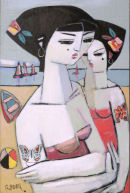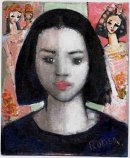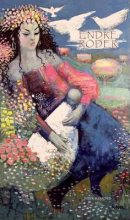Endre Roder
The life of Endre Roder in many respects reflects the turbulent history of Europe and of European art in his life time. It demonstrates clearly how art transcends both political ideologies and the various appalling “isms” of the last century
Endre was born in Budapest in 1933 but following his parent's marital breakdown found himself in Malta while he was still a toddler. Life was peaceful for a few years, far away from the convulsions which afflicted central Europe. This was rudely interrupted by the Second World War during which Malta was heavily bombed and Endre's education disrupted. He began to study art in Malta when he was in his teens after the war but the family moved to England in 1949 as his mother had remarried.
Things settled down again for a short time but world events in the shape of the Cold War and hence National Service intervened and so Endre was called up. After a short career in army Intelligence he was abruptly sent off to Egypt, possibly because his Hungarian connections were judged to be too risky for intelligence work during this period. He then enjoyed a couple of peaceful years as a radio technician before he returned to the UK, this time intending to study to be a cartographer and then an architect.
Something changed his direction away from concrete towards canvas. He continued to paint while pursuing an academic career, his speciality developing from teaching art to art history in which he lectured up to post graduate level. His knowledge of several centuries of artists and their work is, of course, encyclopaedic. The casual observer detects the influence of various major figures in his work but a few minutes conversation rapidly expands this into a roll call of figures, great and not so great.
Something drew Endre to Swanage and he has lived here for a couple of decades. Perhaps it represents an antithesis to the “interesting times” through which he has lived. His output is undiminished and his work continues to be shown at a number of London galleries and selected locations around the country and abroad.
What can I say of the work itself? He cites Kirchner and Balthus as influences but his paintings certainly demonstrate that he has followed his own course, immune from the fashions and tendencies which have come and gone in British art. If asked about influences he laconically suggests, “Think Paris, early twentieth century.”
Commissions
Endre undertakes a limited number of commissions and if you go to the commissions section you can see him at work on one and the final result.
Endre was born in Budapest in 1933 but following his parent's marital breakdown found himself in Malta while he was still a toddler. Life was peaceful for a few years, far away from the convulsions which afflicted central Europe. This was rudely interrupted by the Second World War during which Malta was heavily bombed and Endre's education disrupted. He began to study art in Malta when he was in his teens after the war but the family moved to England in 1949 as his mother had remarried.
Things settled down again for a short time but world events in the shape of the Cold War and hence National Service intervened and so Endre was called up. After a short career in army Intelligence he was abruptly sent off to Egypt, possibly because his Hungarian connections were judged to be too risky for intelligence work during this period. He then enjoyed a couple of peaceful years as a radio technician before he returned to the UK, this time intending to study to be a cartographer and then an architect.
Something changed his direction away from concrete towards canvas. He continued to paint while pursuing an academic career, his speciality developing from teaching art to art history in which he lectured up to post graduate level. His knowledge of several centuries of artists and their work is, of course, encyclopaedic. The casual observer detects the influence of various major figures in his work but a few minutes conversation rapidly expands this into a roll call of figures, great and not so great.
Something drew Endre to Swanage and he has lived here for a couple of decades. Perhaps it represents an antithesis to the “interesting times” through which he has lived. His output is undiminished and his work continues to be shown at a number of London galleries and selected locations around the country and abroad.
What can I say of the work itself? He cites Kirchner and Balthus as influences but his paintings certainly demonstrate that he has followed his own course, immune from the fashions and tendencies which have come and gone in British art. If asked about influences he laconically suggests, “Think Paris, early twentieth century.”
Commissions
Endre undertakes a limited number of commissions and if you go to the commissions section you can see him at work on one and the final result.





